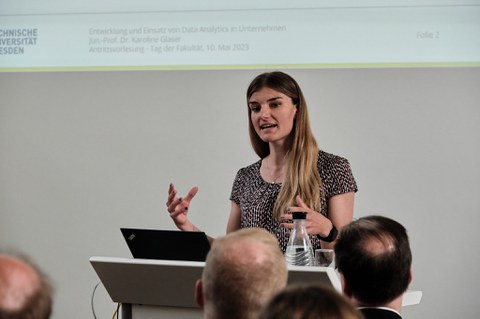Business Information Systems

© Klaus Gigga

© Klaus Gigga

© Marko Ott
Table of contents
Full Chairs
Chair of Business Information Systems, esp. Business Engineering
Prof. Dr. Martin Wiener
Information on Teaching
The focus of the Chair's research and teaching activities is on selected aspects of business engineering in the context of the digital transformation of business and society. Besides the Introduction to Business Information Systems (EWI), courses on Digital Business Engineering (DBE) and Business Process Management (BPM) are offered. The teaching portfolio is rounded off by method courses (e.g., on case study research) and seminars on current topics in business engineering (e.g., on data-driven business models).
Research Focus
- Algorithmic control/management (in platform-based and traditional work contexts) and algorithmic transparency
- Data-driven organizations and digital transformation processes (at the organizational level)
- Socio-technical design of smart machines and servitized business models (in the manufacturing industry)
Chair of Business Information Systems, esp. Information Systems in Industry and Trade
Prof. Dr. Susanne Strahringer
Information on Teaching
Our Chair’s research and teaching centers around information systems (IS) supporting business processes in manufacturing and commerce. In teaching we mainly focus on the issue how information systems and technologies can be used to materialize the idea of fully integrated business processes supporting an end-to-end perspective on the enterprise or via inter-organizational processes on a business network.
From a conceptual point of view, this means looking at different aspects of architecture and integration as well as potential technologies for implementation in combination with managerial issues. Enterprise systems (such as SAP ERP or S/4HANA) play an important role in this context, as they constitute the core of business applications in industry and commerce today, usually required as a starting point in digital transformation initiatives. Thus, these systems are further explored in hands-on exercises, simulation games and projects.
Research Focus
We follow a multi-methodological approach by combining qualitative and quantitative research as well as design science approaches. Our main fields of research are:
- Implementation and use of enterprise systems and their alignment with business goals (enterprise architectures, business/IT alignment, industry 4.0, digitalization) with a focus on industries such as manufacturing and commerce
- Application lifecycle management with a holistic approach to application development, implementation, operations and the respective management as well as governance issues (such as IS sourcing, business-managed IT, maturity models)
- Data-driven organizations and digital transformation processes (at the organizational level)
Chair of Business Information Systems, esp. Intelligent Systems and Services
Prof. Dr. Patrick Zschech
Information on teaching
In teaching, the Chair is dedicated to a wide range of issues relating to business analytics, data science, machine learning and artificial intelligence (AI). In introductory modules, we teach the basics of programming, data analysis and algorithmic solution development in lectures and (computer-based) exercises. Building on this, we offer the opportunity to apply the methodological and conceptual knowledge acquired in advanced in-depth courses in practical project seminars. Here, for example, students work in small groups on real problems from practice or application-oriented research projects. The topics for these projects come from current research initiatives of the Chair and collaborations with practice partners as well as from the participating students' own research and practical projects.
Core research areas
- Design of Intelligent Systems: Socio-technical design of intelligent information systems based on modern data science technologies (e.g. deep learning, generative AI, process mining, natural language processing, computer vision)
- Explainable Artificial Intelligence: Development of algorithmic innovations in the field of intrinsically interpretable AI and machine learning models (e.g. Generalized Additive Models, Optimal Decision Trees) as well as post-hoc analytical explanation methods for black-box models (e.g. based on SHAP or LIME)
- Applied Machine Learning: Application and benchmarking of modern machine learning algorithms in various application domains (e.g. healthcare, production, finance)
- Human-AI Interaction: Empirical investigation of human perception and use of AI systems through user-centered experimental studies (e.g. to investigate algorithm aversion vs. algorithm appreciation)
Junior Professorship for Business Information Systems, esp. Management Analytics
Jun.-Prof. Dr. Karoline Glaser
Information on Teaching
The Junior Professorship focuses on the development and use of enterprise systems and data analytics applications. Our courses aim to provide students with the skills and knowledge needed to deal with data in today's working world. The courses offered "Analytics Application Development" allow students to explore data sets and appropriate analytics methods. Students will be encouraged to think critically about the use and impact of contemporary technological applications and methods, such as data analytics and machine learning, in a business context (Data Ethics). In the context of seminar papers and theses (diploma and master), this critical questioning of socio-technical phenomena (e.g. data analytics in companies) can be continued in the research context in the fields of business informatics and business administration.
Research Focus
- Investigation of the impacts of modern technologies in the organizational context, related to software development as well as to the use of technologies.
- Particular interest on development organizations (e.g., platform ecosystems), development methods (e.g., agile development), and the impact of product characteristics in connection with data analytics
- Analysis of interdependencies between the developers of data analytics applications, the application itself, and the potential users
Extraordinary Professor
Digital Health Research Group
Apl. Prof. Dr. Hannes Schlieter
Mission
Our Research Group investigates, develops, and evaluates innovative digital health solutions and accompanies their integration into information system landscapes to improve healthcare and help people. We strive to integrate complex socio-technical processes, active patient participation, quality-oriented care models, and lived interoperability.
Information on Teaching
As a group closely integrated into interdisciplinary national and international research projects, our teaching focuses on business information basics and domain-specific knowledge for describing and designing information systems in healthcare. In the focus area of health care management, we offer the courses "Health Information Management (HIM)" and "Health Care Management (HCM)" and impart the latest scientific knowledge from these topics to the students in an interdisciplinary way. Furthermore, we want to encourage students to experience the broad spectrum of engineering-oriented Business Information Systems. For this purpose, we offer the project seminar "Software Development" and the course "Model-Based Management". In addition, we have a rich catalog of thesis topics on our website.
Research Focus
The center of our research and development activities is the theoretical foundation, design, and optimization of complex information systems as they are found in integrated care, patient-oriented, and process-oriented information system design. Our research and development work focuses on the design-oriented and engineering-like problem-solving of business information challenges, the generation of evidence on digital healthcare solutions, and the theoretical foundation and reflection of complex design decisions. The goal of our research is always to balance theory and technology while adding value to research and practice through both practical relevance and scientific rigor. The theories and technologies developed can be used in various application areas.
- Theoretical foundation, design, and optimization of complex information systems as they are found in integrated care, patient-oriented, and process-oriented information system design
- Primary topic lines of the Research Group:
1. Patient-Centered Health Information Systems
2. Behavioural Change Support Systems
3. Digital Health Ecosystems
4. Methods, Modeling, and Theories in Wirtschaftsinformatik
Career Perspectives
With the scientific and applied profile of a Business Information Systems specialist, you have an excellent prerequisite for both science and business to be employed in administration, consulting, and industry. The healthcare sector, in particular, also offers an exciting and crisis-proof domain with many digitization projects on the agenda.
Co-opted professors
Chair for Medical Device Regulatory Science
Prof. Dr. Stephen Gilbert
Senior Professor
Honorary professors
Honorary Professor of Business Information Systems, esp. eGovernment
Prof. Dr. Michael Breidung
Honorary Professor of Business Information Systems, esp. Knowledge-based Applications
Prof. Dr. Lothar Simon








